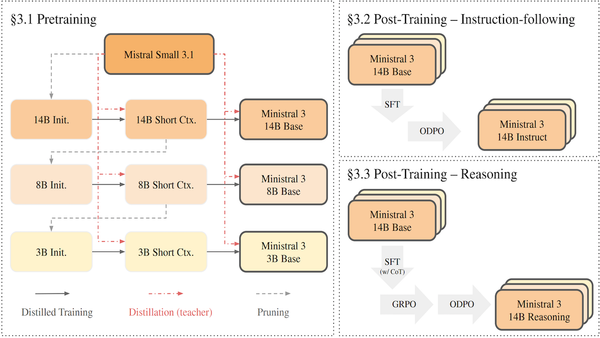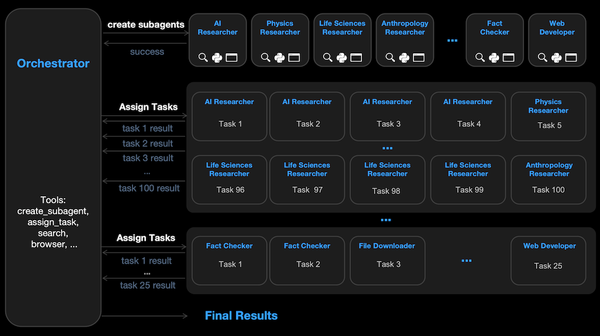Meta AI now recognizes 1600 languages: Amazon and Perplexity spar over browser agents
Kimi K2 Thinking, the new top open model. Deep Research’s expansion to personal documents. Terminal-Bench makers’ new agentic benchmark. TSMC’s slowing revenue growth.

In today’s edition of Data Points, you’ll learn more about:
- Kimi K2 Thinking, the new top open model
- Deep Research’s expansion to personal documents
- Terminal-Bench makers’ new agentic benchmark
- TSMC’s slowing revenue growth
But first:
Omnilingual ASR recognizes speech for over 1,600 languages
Meta’s Fundamental AI Research team launched Omnilingual ASR, a suite of models that transcribes speech in more than 1,600 languages, including 500 low-resource languages never before transcribed by AI. The system uses a 7 billion parameter wav2vec 2.0 speech encoder paired with two decoder variants, achieving character error rates below 10 percent for 78 percent of supported languages. Users can extend the system to new languages using just a few audio-text sample pairs through in-context learning, eliminating the need for large training datasets or specialized expertise. The release offers a significant expansion in speech recognition accessibility, particularly for underrepresented language communities that have historically lacked high-quality transcription tools. Meta released all models under Apache 2.0 license, along with the Omnilingual ASR Corpus covering 350 underserved languages under CC-BY license. (Meta)
Amazon sues Perplexity to block AI agent from making purchases
Amazon filed a lawsuit against Perplexity AI to stop the startup’s Comet browser agent from making purchases on behalf of users on Amazon.com, accusing the company of computer fraud and violating its terms of service by disguising AI agents as real users. The e-commerce giant claims Perplexity continued deploying shopping bots even after being asked to stop in November 2024, and later circumvented Amazon’s security measures designed to block the agents. Perplexity CEO Aravind Srinivas defended the practice, arguing that AI agents should have “all the same rights and responsibilities” as human users and accused Amazon of bullying competitors while trying to protect its advertising business. The case could set important precedents for how far agentic AI systems can go in performing real-world tasks like shopping, as companies including Amazon, OpenAI, and Google race to develop their own AI agents. Disclosure: DeepLearning.AI’s Andrew Ng is a member of Amazon’s board of directors. (Bloomberg/Yahoo)
Kimi K2 Thinking beats more costly models on agentic tasks
Moonshot AI released Kimi K2 Thinking, a 1 trillion parameter reasoning model that currently ranks as the best open-source LLM and outperforms GPT-5 and Claude Sonnet 4.5 on several agentic benchmarks. The model scored 44.9 percent on Humanity’s Last Exam with tools enabled, beating GPT-5’s 41.7 percent, and achieved 60.2 percent on BrowseComp compared to GPT-5’s 54.9 percent by using an “interleaved thinking” approach that reasons between up to 300 tool calls. Moonshot trained the model for approximately $4.6 million using native INT4 quantization, which reduced the model size to 594GB and allowed it to run on less powerful hardware. Like DeepSeek-R1, K2 Thinking’s release challenges the notion that expensive proprietary model development remains necessary. The model is available under a modified MIT license that requires Kimi K2 branding for commercial services exceeding 100 million monthly active users or $20 million in monthly revenue. (Hugging Face and CNBC)
Gemini Deep Research can access Gmail, Docs, Drive, and Chat
Google expanded its Gemini Deep Research tool to pull information directly from users’ Gmail, Google Drive (including Docs, Slides, Sheets, and PDFs), and Google Chat alongside web sources. Users can now create comprehensive reports that combine internal company documents, email threads, and team chats with public web data—for example, analyzing competitor products using both proprietary strategy documents and external market information. The feature is available to all Gemini users on desktop through the Tools menu, with mobile access rolling out in the coming days. This integration addresses one of users’ most-requested features by allowing AI research to incorporate personal and organizational context rather than relying solely on public web information. (Google)
Terminal-Bench 2.0 and Harbor now available for AI agent evaluation
The makers of Terminal-Bench released Harbor, a new framework that enables developers to evaluate and improve AI agents at scale using cloud-deployed containers. Harbor addresses common challenges in agent development by supporting horizontal scaling to thousands of containers, providing interfaces for supervised fine-tuning and reinforcement learning, and working with any agent that can be installed in a container. The release includes Terminal-Bench 2.0, a more difficult and better-verified version of the popular agent evaluation benchmark that launched in May 2024. The original Terminal-Bench became widely adopted by major AI labs and built a community of 1,000 Discord members and 100 GitHub contributors. Terminal-Bench 2.0 underwent extensive manual and language model-assisted verification to fix quality issues from version 1.0, such as tasks that broke due to changing website protections. (Terminal-Bench)
TSMC reports slowest monthly revenue growth since February
Taiwan Semiconductor Manufacturing Co. posted a 16.9 percent increase in October sales, its slowest monthly growth rate in eight months. The semiconductor manufacturer faces tight capacity constraints as major chip designers, including Nvidia and AMD, compete for production slots to meet surging AI chip demand. Despite the slower growth rate, industry executives remain optimistic about AI-driven expansion, with Meta, Alphabet, Amazon, and Microsoft planning to spend over $400 billion on AI infrastructure in 2026, a 21 percent increase from 2025. The news comes amid broader market concerns about a potential correction in AI and semiconductor stocks, following a recent slump in Asian technology shares. (Bloomberg/Yahoo)
A special offer for our community
DeepLearning.AI just launched the first-ever subscription plan for our entire course catalog! As a Pro Member, you’ll immediately enjoy access to:
- Over 150 AI courses and specializations from Andrew Ng and industry experts
- Labs and quizzes to test your knowledge
- Projects to share with employers
- Certificates to testify to your new skills
- A community to help you advance at the speed of AI
Enroll now to lock in a year of full access for $25 per month paid upfront, or opt for month-to-month payments at just $30 per month. Both payment options begin with a one week free trial. Explore Pro’s benefits and start building today!
Want to know more about what matters in AI right now?
Read the latest issue of The Batch for in-depth analysis of news and research.
Last week, Andrew Ng talked about the importance of controlling your own data to leverage AI agents effectively, the challenges posed by SaaS vendors creating data silos, and the increasing value of organizing unstructured data for AI readiness.
“Unfortunately, many SaaS vendors try to create a data silo in their customer’s business. By making it hard for you to extract your data, they create high switching costs. This also allows them to steer you to buy their AI agent services — sometimes at high expense and/or of low quality — rather than build your own or buy from a different vendor.”
Read Andrew’s letter here.
Other AI news and research stories we covered that might scare you to your bones:
- OpenAI has completed a restructuring, freeing it to go public and make deals with new partners, marking a significant milestone.
- MiniMax-M2 emerges as a leader in open-weights coding, offering top performance with a lightweight footprint and low costs.
- Universal Music Group and music generator Udio have struck a deal to settle a lawsuit and build a new platform to remix copyrighted music, signaling a new embrace of AI by the music industry.
- Google researchers released VaultGemma, an open-weights model designed to redact personal information, enhancing privacy in AI training sets.




